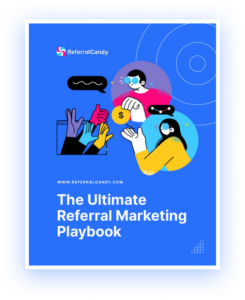Hellen started Small Stuff in 2016 to sell ethical children’s products in Sheffield, UK. Small Stuff was built on her belief that we need to start minimizing overconsumption and to fill a need for a sustainable alternative for new parents.
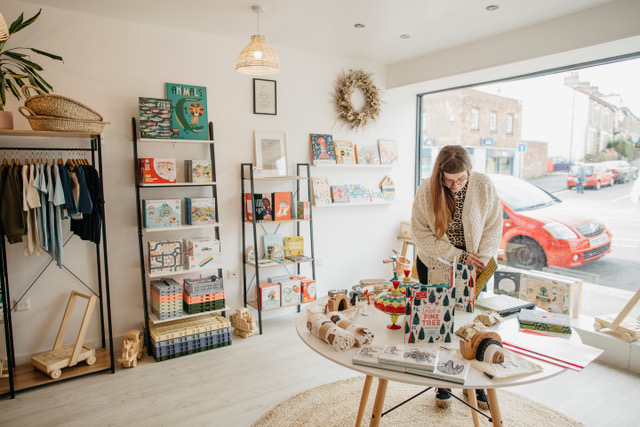
Hellen in her shop, Small Stuff
When Hellen gave birth to her son in 2016, her eyes were opened to the unsustainable world of children’s toys’.
She was concerned about how wasteful so many children’s toys were, and the lack of care for their origins.
“Lots of places were just selling a lot of brightly colored toys and games and things that were very aimed at ‘in the moment purchasing’. Nothing seemed to have much longevity. Also, the clothes out there were all either for a little boy or a little girl only. And, there didn’t seem to be any sort of understanding of where the children’s clothes came from or what they were created with.”
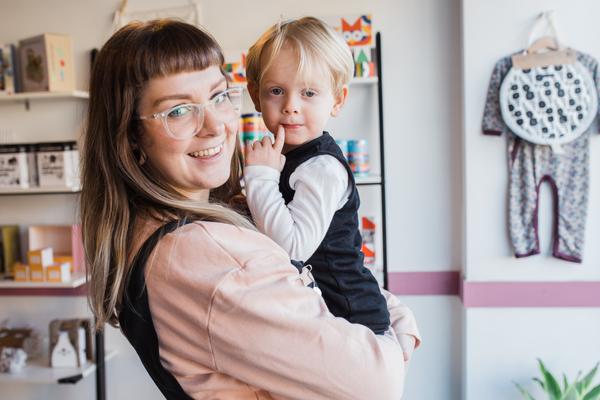
Hellen, owner of Small Stuff UK, and her son
As a new mother, she felt there was pressure to purchase endless amounts of new things for her child. “I found it really quite daunting and for the first few months I thought something had to give.”
Hellen had always been interested in living sustainably and wanted to find a way to tie this into a job. She had an idea to start creating her own clothes with fabrics with traceable supply chains.
As her interest in goods with traceable materials grew, she started to create more clothes and toys for her little boy.
Friends were impressed and encouraged her to make more.
So, she started by creating an Instagram to collaborate with other makers and creators. She found independent businesses that shared an interest in transparent supply chains and was inspired to take on other small brands to sell. This was the beginning of Small Stuff.
“Having lots of little brands takes the pressure off me from creating things.” But selling online wasn’t Hellen’s preference. It was important to her for customers to see products in real life so they could see the physical quality and have conversations about transparency.
She wanted to emphasize that the products were long-lasting and really communicate that she wasn’t interested in just selling as much as possible. As orders kept coming in, she decided to start doing pop-up shops to connect with her customers.
“People really seemed engaged. But I had a lot of conversations with people that didn’t quite get it. Lots of people still didn’t really understand the bigger picture of what these products were about, what was happening with these products, and what the supply chains looked like.”
She found it had been ‘ingrained’ into new parents that they had to constantly buy brand new toys and clothes for their children.
She decided to make it her mission to help other parents understand the impact of their purchasing decisions.
As time went on, more and more people started to understand her mission. This encouraged her to take the leap to open her own physical store, to try and grow the business from pop-ups only.
She recalls how finding the building was serendipitous.“Me and my husband were going for a coffee in the high street, five minutes from where my parents live and where I grew up. I hadn’t been up there for ages and we passed [her now store] and we saw a tiny little note in the window that said for lease.”
After having success with pop-up shops, that moment was the push she needed to take the next step.
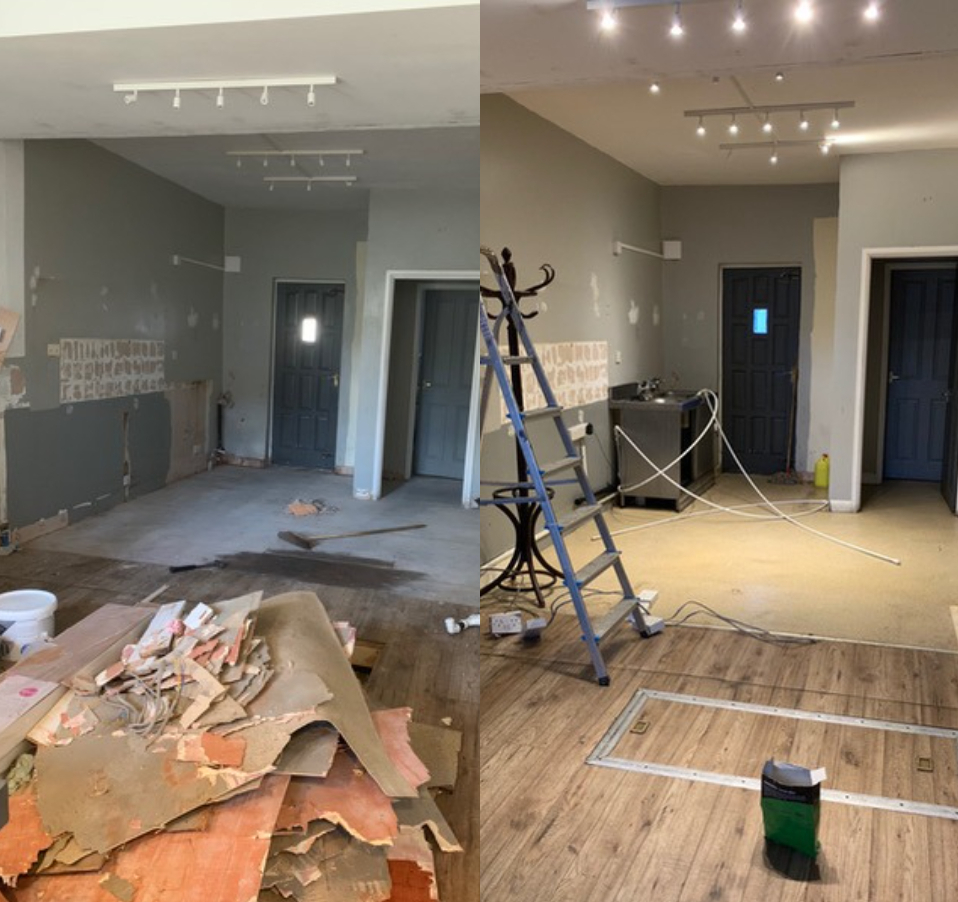
Before and During Hellen’s DIY Renovations of Small Stuff
“We put it together on a shoestring. literally borrowing everything! The guys in there before had left loads of plywood, so we pretty much built everything in there with all the old stuff. We just put together as best we could and opened up!”
After a month of long days and late nights, the shop was ready to open.
Hellen had limited stock – just what she had left from her last pop-up. ‘People would come in and say ‘you don’t have much, do you?’ and I’d say ‘well yeah, but, what we do have is really really good!”
Looking back, she doesn’t regret the move to open with limited resources.
“I could have waited and perfected as much as I possibly could and spent lots of money. But I thought I’d just go for it with what we’ve got and see what happens! It just grew, which is amazing. There was barely anything on the shelves, but we just spread out all over this huge shop.”
Hellen found there were many benefits to retailing offline.
“Online, I was just a tiny little fish in such a huge ocean of things.” It had been difficult for Hellen to get her message across and explain why things cost more. She found herself writing pages and pages to explain the story behind the products. This information would be so much easier to explain face to face.
Hellen believes it’s really important to be able to physically touch clothes to feel the quality and longevity.
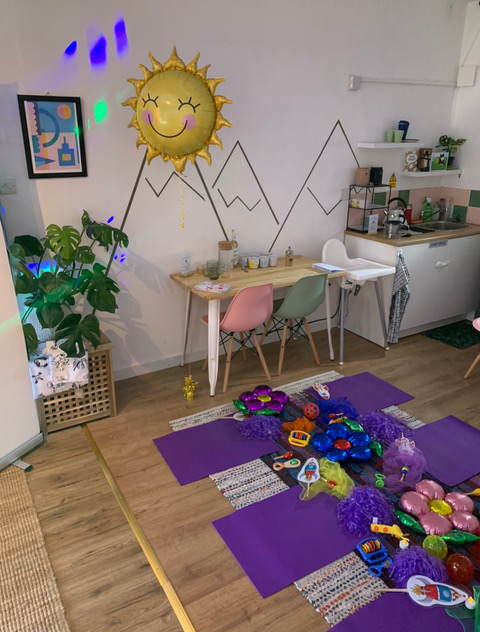
But having a retail store is so much more of a risk than just an online one. “You’d open the shop in the morning some days and footfall would be really slow. There’d be nobody walking past. And I’d look out the window thinking, ‘is this it? Am I going to need to shut down?’ And then the next day would be really really busy and make up for the day before. But there were so many days when I’d sit there and really wonder ‘have I made the right decision?”
Hellen questioned whether selling things to people conflicted with her goal of minimizing overconsumption.
Ultimately, Hellen reassures herself that she is contributing by selling good quality products that last generations. “I’m not in this for making hundreds of pounds. As long as I can pay myself, my staff, and my overheads, it’s really about getting this message out that there is an alternative to always shopping.”
Hellen now collaborates with a network of talented makers who provide the stock for Small Stuff.
“When I started the business, I thought I could do everything….you learn over time actually things work a lot better if you collaborate with other people. Everything in-store is made by other really good makers that are doing a much better job than I could ever do.”
However, Hellen still enjoys creating her own products and loves that the shop allows her time to still be creative. Before the shop, Hellen had a range of high-pressure jobs. From managing a tattoo shop to working at Apple. She loves the fact her business now allows her more time with her family.
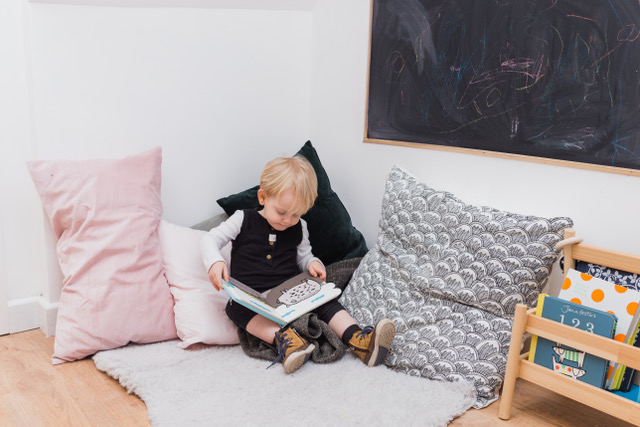
Hellen’s son in the reading corner of Small Stuff
She now hopes that the shop will be a legacy for her children to carry on.
Hellen is always striving to ‘close the loop’.
For example, she buys lightly worn clothes that she can resell at a reduced price. From her own experience with her son, she knows how quickly children grow out of clothes. This initiative allows whose child has grown out of their clothes to back and swap for larger ones, creating a more circular economy.
She has also been using traditional methods to restore toys. This service is in line with her ‘close the loop’ initiative and taps into the community-driven side of her business.
Some warned Hellen that her beliefs go against the ‘rules of business.’
Advisors said that her initiatives would impact the longevity of her business. Friends expressed concern that if she only sells products that will last for generations, people won’t need to keep buying from her. So far she’s proved the naysayers wrong, as she is always innovating. She earns the trust of her customers and provides them with exceptional service – so they keep coming back. Another concept she has introduced is a repair service.
“I’m always finding different ways to get people back through the door.”
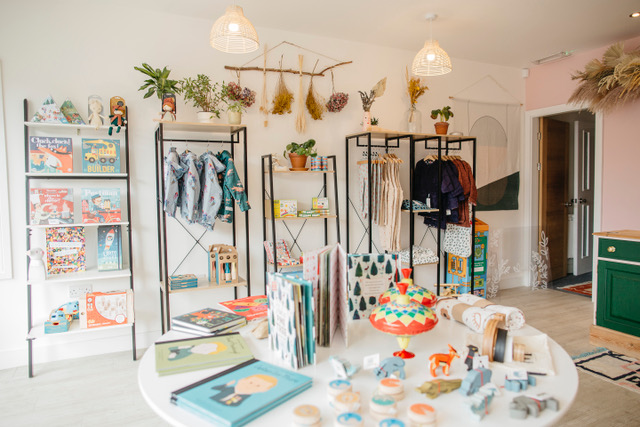
Ultimately, her goal is to build trust with her customers and educate them about sustainability. By doing so, she has built a solid reputation and a strong following driven by word-of-mouth recommendations. “People from further afield will come and buy from us now.”
Hellen’s goal is to continue positively impacting her community.
She has been raising money for charities and offering her space to social enterprises. Hellen also regularly collaborates with ethical business groups to find more ways to use her shop to positively impact people and the planet.
Community is very important to Hellen. She loves to chat with people so when she opened the physical store she hosted started children’s groups on site. This concept has since further expanded and she now runs workshops and community groups, yoga, and much more from her store. Hellen’s customers’ trust allows her to continue growing the business with these extra initiatives, even though she may sell lower volumes than a traditional shop.
…
Hellen, after giving birth to her son, was shocked at the overconsumption that is expected when you become a new parent. She wanted to forge an alternative path, by making a lot of her own products from traceable materials. She opened Small Stuff after friends encouraged her to sell what she made, and began to collaborate with local makers to stock her shop with products that would last, and were made with conscience.
Merchant Stories: Real entrepreneur stories from real people. If you’d like to share your merchant stories, email us.


